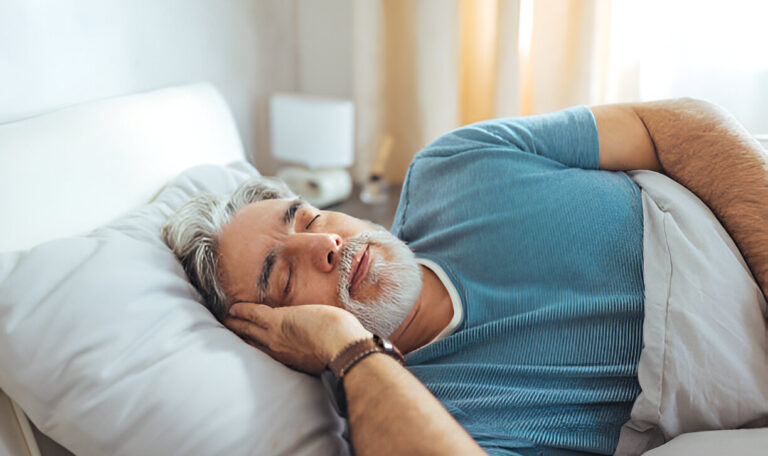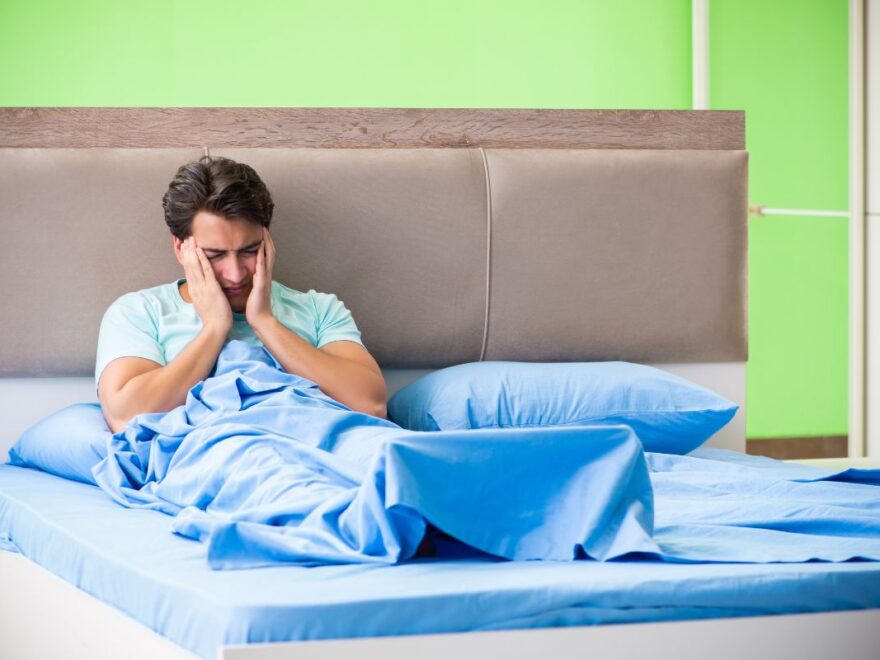Insomnia
Insomniais a common sleep disorder that can make falling or staying asleep hard. It also can cause you to wake up too early and not be able to get back to sleep. You may still feel tired when you wake up.
While the amount of sleep needed varies from person to person, most adults need 7 to 9 hours a night.
At some point, many adults have short-term insomnia. This can last for days or weeks. Short-term insomnia is usually due to stress or a painful event. However, some people have long-term insomnia, also called chronic insomnia. This stays for three months or more. Insomnia may be the main problem, or it may be related to other medical conditions or medicines.
You do not have to put up with sleepless nights. Simple changes in your daily habits can help.

Symptoms of Insomnia
Insomnia symptoms may include:
- Having a hard time falling asleep at night.
- Waking up during the night.
- Waking up too early.
- Feeling tired or sleepy during the day.
- Feeling annoyed, depressed or anxious.
- Having a hard time paying attention, focusing on tasks or remembering.
- Making more errors or having more accidents.
- Having ongoing worries about sleep.
When to See A Doctor?
If insomnia makes it hard for you to do daily activities, see your doctor or another primary care professional. Your doctor will search for the cause of your sleep problem and help treat it. If it’s thought that you could have a sleep disorder, your doctor might suggest going to a sleep centre for special testing.
Causes of Insomnia
Insomnia may be the main problem, or it may be related to other illnesses.
Long-term insomnia is usually caused by stress, life events, or habits that upset sleep. While treating the cause of your sleep problem may stop your insomnia, it can sometimes last for years.
Common causes of long-term insomnia include:
- Stress: Worries about work, school, health, money, or family can keep your mind active at night, making it hard to sleep. Stressful life events, such as the death or illness of a loved one, divorce, or job loss, may also lead to sleeplessness.
- Travel Or Work Schedule: Your body’s “internal clock,” known as circadian rhythms, directs your sleep-wake cycle, metabolism and body temperature. Disturbing these rhythms can lead to insomnia. Causes include feeling tired from travelling across numerous time zones, working a late or early shift, or changing shifts often.
- Poor Sleep Habits: They include going to bed and waking up at different times each day, taking naps, being too active before bedtime, and having a sleeping area that is not comfortable. Other poor sleep habits include working, eating, or watching TV while in bed. Using computers or smartphones, playing video games, or watching TV just before bed can also affect one’s sleep cycle.
- Eating Too Late In The Evening: A light snack before bedtime is OK. However, overeating may cause you to feel uncomfortable while lying down. Many people also have heartburn. This is when stomach acid goes back into the tube that carries food from your mouth to your stomach. This tube is called the oesophagus. Heartburn may keep you sleepless.
- Mental Health Disorders: Anxiety disorders, such as post-traumatic stress disorder, may impact your sleep. Waking up too early can be a sign of depression. Insomnia often occurs with other mental health conditions.
- Medicines: Many medications can interfere with sleep, such as certain antidepressants and pills for asthma or blood pressure. Many medicines available without a prescription, such as some pain medicines, allergy and cold medicines, and weight-loss products, contain caffeine and other stimulants that can disrupt sleep.
- Medical Conditions: Examples of problems linked with insomnia include ongoing pain, cancer, diabetes, heart disease, asthma, gastroesophageal reflux disease (GERD), overactive thyroid, Parkinson’s disease and Alzheimer’s disease.
- Sleep-related Disorders: Sleep apnea causes you to stop breathing at times during the night, disrupting your sleep. Restless legs syndrome causes a strong, uncomfortable urge to move your legs when trying to fall asleep. This may keep you from falling asleep or getting back to sleep.
- Caffeine, Nicotine and Alcohol: Coffee, tea, cola and other drinks that have caffeine are stimulants. Drinking them in the late afternoon or evening can keep you from falling asleep at night. Nicotine in tobacco products is another stimulant that can disrupt sleep. Alcohol may help you fall asleep, but it prevents deeper stages of sleep and often results in waking up in the middle of the night.
Insomnia and Aging
Insomnia becomes more common with age. As you get older, you may:
- Change Your Sleep Patterns. Sleep often becomes less restful as you age, so noise or other changes in your surroundings tend to wake you up. With age, your internal clock changes and you get tired earlier in the evening and wake up earlier in the morning. But older people typically still need the same amount of sleep as younger people.
- Change Your Level Of Activity: You may be less physically or socially active. A lack of activity can impact a good night’s sleep. Also, the less active you are, the more likely you may be to take a daily nap. Napping (a short period of sleep) can disrupt sleep at night.
- Have Changes In Your Health: Ongoing pain from conditions such as arthritis or back problems, as well as depression or anxiety, can affect sleep. Issues that make you urinate during the night, such as prostate or bladder problems, can affect sleep. Sleep apnea and restless legs syndrome become more common with age.
- Take More Medicines: Older people typically use more prescription medicines than younger people do. This increases the chance of insomnia related to medicines.
Insomnia In Children And Teens
Sleep problems may be an issue for children and teenagers, too. But some children and teens simply have problem getting to sleep or avoid a regular bedtime because their internal clocks are more delayed. They want to go to bed later and sleep later in the morning.
Risk Factors of Insomnia
Nearly everyone has a sleepless night sometimes. But you have more chances to have insomnia if:
- You’re A Woman: Changes in hormones during the menstrual cycle and in menopause may play a role. During menopause, night sweats and hot flashes often impact sleep. Insomnia is also common during pregnancy.
- You’re Over 60: Because of changes in sleep patterns and health, there are more chances that you’ll have insomnia as you get older.
- You Have A Mental Health Or Physical Health Condition: Many issues that affect your mental or physical health can affect sleep.
- You’re Under A Lot Of Stress: Stress can cause short-term insomnia. Major or long-lasting stress can lead to long-term insomnia.
- You Do Not Have A Regular Schedule: For example, changing shifts at work or travelling can disrupt your sleep-wake cycle.
Complications of Insomnia
Sleep is as important to your health as a healthy diet and regular physical activity. Whatever is keeping you from sleeping, insomnia can affect you mentally and physically. People with insomnia report a lower quality of life compared with people who sleep well.
Complications Of Insomnia May Include:
- Lower performance on the job or at school.
- Slow reaction time while driving and a higher risk of accidents.
- Mental health conditions, such as depression, anxiety or substance misuse.
- Higher risk or worsening of long-term diseases or conditions, such as high blood pressure and heart disease.
Prevention of Insomnia
Good sleep habits like these can help prevent insomnia:
- Keep the time you go to bed and wake up the same every day, including weekends.
- Stay active. Regular activity can lead to a good night’s sleep.
- Limit naps or do not nap at all.
- Limit or do not use caffeine, alcohol and nicotine.
- Do not eat a big meal or drink a lot of fluids before bed.
- Make your bedroom comfortable for sleep, and only use it for sex or sleep.
- Create a relaxing bedtime routine, such as taking a warm bath, reading or listening to soft music.
Diagnosis of Insomnia
Depending on your situation, the diagnosis of insomnia and the search for its cause may include:
- Physical Exam: If the cause of insomnia is not known, your healthcare professional may do a physical exam to look for signs of medical problems related to insomnia. Sometimes, a blood test may be done to check for thyroid problems or other conditions related to poor sleep.
- Sleep Habits Review: Besides asking questions about your sleep, your doctor or other health care professional may have you complete a questionnaire to show your sleep-wake pattern and your level of daytime sleepiness. You may also be asked to keep a sleep diary for a few weeks.
- Sleep Study: If the cause of your insomnia is not clear, or you have signs of another sleep disorder, such as sleep apnea or restless legs syndrome, you may need to spend a night at a sleep centre. Tests are done to track and record various body activities while you sleep. This includes brain waves, breathing, heartbeat, eye movements and body movements.
Treatment of Insomnia
Changing sleep habits and taking care of any issues related to insomnia, such as stress, medical conditions or medicines, can result in peaceful sleep for many people. If these steps do not work, your doctor may recommend cognitive behavioral therapy (CBT), medicines or both to improve relaxation and sleep.
CBT For Insomnia
Cognitive behavioral therapy for insomnia can help you control or stop negative thoughts and actions that keep you awake. It’s usually recommended as the first treatment for people with insomnia. Typically, CBT is as effective or more effective than sleep medicines.
The cognitive part of CBT teaches you to learn and change beliefs that affect your sleep. It can help you control or stop negative thoughts and worries that keep you awake. It also may involve ending the cycle of worrying so much about getting to sleep that you cannot fall asleep.
The behavioral part of CBT helps you learn good sleep habits and stop behaviors that keep you from sleeping well.
Strategies Include:
- Stimulus Control Therapy: This method helps train your mind and body to sleep better and not fight sleep. For example, you might be taught to set a regular time to go to bed and wake up, not nap, and use the bed only for sleep and sex. You also may be trained to leave the bedroom if you cannot go to sleep within 20 minutes, only going back when you’re sleepy.
- Relaxation Methods: Progressive muscle relaxation and breathing exercises are ways to lower anxiety at bedtime. Practicing these methods can help you control your breathing, heart rate and muscle tension so that you can relax.
- Sleep Restriction: With this method, you reduce the time you spend in bed and stop napping during the day, so you get less sleep. This makes you more tired the next night. Once your sleep improves, you slowly increase your time in bed.
- Remaining Passively Awake: Also called paradoxical intention, this practice for learned insomnia aims to reduce your worry and anxiety about being able to get to sleep. You get in bed and try to stay awake rather than expect to fall asleep. This approach reduces your extreme focus on sleep and anxiety over not sleeping, making it easier to fall asleep.
- Light Therapy: If you fall asleep too early and then wake up too early, you can use light to push back your internal clock. You can go outside when it’s light outside in the evenings or you can use a light box. Talk to your doctor for advice.
Your doctor may recommend other strategies related to your lifestyle and sleep area to help you create habits that lead to sound sleep and daytime alertness.
Medicines For Insomnia
Sleeping pills can help you get to sleep, stay asleep or both. Doctors generally do not recommend relying on prescription sleeping pills for more than a few weeks. And medicines should not be the only treatment. However, many medicines are approved for long-term use.
It’s not known how long medicines can be wisely used. Instead, medicines are offered on a case-by-case basis, with you and your doctor checking the benefits and risks. Generally, it’s best to use the lowest effective dose and not use medicines for too long.
Prescription sleeping pills can have side effects, such as causing daytime annoyance and creating a higher risk of falling. They also can be habit-forming. If your doctor prescribes a medicine to help you sleep, ask for more information, including possible side effects and how long you can take it.
Sleep Aids Available Without A Prescription
Sleep medicines available without a prescription contain antihistamines that can make you sleepy. These medicines are not for regular use. Talk to your doctor before you take these medicines, as antihistamines may cause side effects. Side effects may include daytime sleepiness, confusion, problems with thinking and difficulty in urination. Side effects may be worse in older adults.
Lifestyle And Home Remedies
No matter your age, insomnia typically can be treated. The key often lies in changes to your routine during the day and when you go to bed.
These tips may help:
- Follow a sleep schedule: Keep your bedtime and wake time the same every day, including on weekends.
- Stay active: Regular activity can lead to a good night’s sleep. Exercise at least a few hours before you go to bed. Do not take part in activities that use a lot of energy too close to bedtime.
- Check your medicines: If you take medicines regularly, check with your doctor to see if they may be playing a part in your insomnia. Also, check the ingredients of products available without a prescription to see if they contain caffeine or other stimulants, such as pseudoephedrine.
- Limit or stop naps: Short periods of sleep can make it harder to fall asleep at night. If you cannot get by without one, try to limit a nap to no more than 30 minutes. Also, do not take a nap after 3 p.m. if your regular sleep time is at night.
- Limit or do not use caffeine, alcohol and nicotine: Caffeine, alcohol and nicotine can make it difficult to sleep. This effect can last for several hours.
- Do not put up with pain: If a painful condition affects you, talk to your doctor about which pain relievers may control pain while you sleep.
- Do not eat large meals or drink a lot of fluids before bed: A light snack is fine and may help avoid heartburn. Drink less liquid before bedtime so that you will not have to go to the bathroom as often.
At bedtime:
- Make your bedroom comfortable for sleep: Only use your bedroom for sex or sleep. Keep it dark, quiet and at a comfortable temperature. Hide all clocks in your bedroom, including your watch and cellphone. That way, you do not worry about what time it is.
- Find ways to relax: Try to put your problems and planning aside when you get into bed. A warm bath or a massage before you go to bed can help prepare you for sleep. Create a relaxing bedtime ritual, such as taking a hot bath, reading, listening to soft music, doing breathing exercises or yoga, or praying.
- Do not try too hard to sleep: The more you try to sleep, the more awake you’ll become. Read in another room until you become sleepy. Then go to bed to sleep. Do not go to bed too early, before you’re sleepy.
- Get out of bed when you’re not sleeping: Sleep as much as you need to feel rested. Then get out of bed. Do not stay in bed if you’re not sleeping.
Alternative Medicine
Many people never visit their doctor or other health care provider for insomnia. They try to cope with sleeplessness on their own.
Some people try therapies such as:
- Melatonin: This supplement, which is available without a prescription, is famous for fighting insomnia. It’s generally considered safe to use melatonin for a few weeks. But there is no evidence to prove that it effectively treats insomnia, and long-term safety is not known.
- Valerian: This dietary supplement is sold as a sleep aid because it has a mildly sleeping effect. It has not been well-studied. Discuss valerian with your doctor before trying it. Some people who have used high doses or used it long term may have had liver damage. But it’s not clear if valerian caused the damage.
- Acupuncture: This therapy is commonly used to treat insomnia. But this therapy is generally not recommended due to a lack of proof that it’s beneficial.
- Yoga or tai chi: Some studies suggest that the regular practice of yoga or tai chi can improve sleep quality. But this therapy is generally not recommended due to a lack of evidence that it’s beneficial.
- Meditation: Several small studies suggest that meditation along with conventional treatment may help improve sleep and reduce stress.
Caution About Herbal And Dietary Sleep Aids
Talk with your doctor before taking any products available without a prescription. Some products can be harmful, and some can cause harm if you take certain medicines.
Insomnia can easily be treated by connecting with a psychologist or a psychiatrist. If you don’t have access to one, book an appointment with SehatYab’s online platform. This virtual platform provides mental health patients with an opportunity to get prolonged therapies from the best psychologists and psychiatrists in Pakistan, without having to step out of their homes. Also, it is highly cost-effective and economical.
Preparing For Your Appointment
If you’re having sleep problems, you’ll likely start by talking to your primary care professional. Ask if there’s anything you need to do before your appointment, such as keeping a sleep diary. Take your bed partner along. Your partner can give information about how much and how well you’re sleeping.
What You Can Do?
Prepare for your appointment by making a list of:
- Your symptoms, including any that may not relate to the reason for the appointment.
- Personal information, including new or ongoing health problems, major stresses or recent life changes.
- All medicines you take, including medicines available without a prescription, vitamins, and herbal or other supplements, as well as the doses. Let your doctor know about anything you’ve taken to help you sleep.
- Questions to ask your doctor to make the most of your appointment time.
Basic Questions To Ask Include:
- What is likely causing my insomnia?
- What’s the best treatment?
- How can I create an ideal sleep environment?
- How can I manage insomnia with my other health conditions?
- Should I go to a sleep clinic or sleep specialist? Will my insurance cover it?
- Are there any brochures or other printed material that I can have?
- What websites do you recommend?
Do not hesitate to ask other questions during your appointment.
What to expect from your doctor
Your doctor may ask you several questions.
Common questions about insomnia include:
- How often do you have trouble sleeping?
- When did the insomnia begin?
- How long does it take you to fall asleep?
- Do you snore or wake up choking for breath?
- How often do you wake up at night, and how long does it take you to fall back to sleep?
- What is your response when you cannot sleep?
- What have you tried to improve your sleep?
Common questions about daytime routine include:
- Do you feel refreshed when you wake up or tired during the day?
- Do you doze off or have trouble staying awake while sitting quietly or driving?
- Do you nap during the day?
- What do you typically eat and drink in the evening?
Common questions about bedtime routine include:
- What is your bedtime routine?
- Do you take any medicines, such as sleeping pills, before bed?
- What time do you go to bed and wake up? Is this different on weekends?
- How many hours a night do you sleep?
Common questions about other issues that may affect sleep include:
- Have any stressful events occurred recently?
- Do you use tobacco or drink alcohol?
- Do you have any family members with sleep problems?
- What medicines do you take regularly?
- Do you experience an uncomfortable urge to move your legs when trying to fall asleep?
Our Doctors for Insomnia Treatment
Dr. Qurrat Ulain
Psychiatrist
MBBS (AMC-NUST), FCPS Gold Medalist (Psychiatry), OJT Child and Adolescent Mental Health (UK), Certified ADOS Administrator (Sunfield Centre USA)
Experience: 12+ years
Dr. Ali Ajmal
Clinical Psychologist
MSc, M.Phil. Applied Psychology (Punjab), PhD (Clinical Psychology), Advanced diploma in clinical psychology (ADCP)
Experience: 11+ years
Mr. Hayat Ali Yousefzai
Clinical Psychologist
ECPS (ISSM), CHPE (JSMU), SRHR (Geneva Foundation), MS Psychology, PhD Clinical Psychology (Continue), Member of American Psychological Association (APA), Member of International Society for Sexual Medicine, Member of Pakistan Psychological Association
Experience: 10+ years
Ms. Maryam Khan
Clinical Psychologist
BSc (Psychology), MSc (Psychology) – QAU Islamabad, PGDCP (Clinical Psychology), Certified: Hypnotherapist (NGH, USA), Play Therapist, Psycho-sexual Disorder Therapist, Cognitive-behavioral Therapist
Experience: 8+ years
Ms. Kalsoom Yasin
Clinical Psychologist
MPhil (Clinical Psychology), BS (Applied Psychology), Member Australian & New Zealand Mental Health Association, Pakistan Psychological Association
Experience: 5+ years
Our blogs on Insomnia







